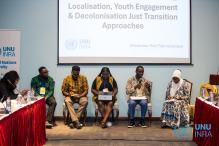The need for urgent and concrete action in mitigating climate change and addressing its impacts was recognised during the June 2014 G7 Summit as well as the 2014 UN Climate Summit in September, and was a main issue during the UNFCCC COP 20 in 2014, the World Conference on Disaster Risk Reduction in March 2015 as well as the 2015 G7 Summit, the UN Post-2015 Summit in 2015 and the UNFCCC COP 21, which is to decide on a new climate agreement. As part of these discussions, the international community is exploring ways to enhance particularly vulnerable countries’ own efforts to manage climate change induced disaster risk. The G7 has a role to play in this agenda and in its implementation. The G7 Climate Risk Insurance Initiative (G7 CRII) acknowledges the role insurance can play in a comprehensive climate risk management approach. As risk transfer instrument, climate risk insurance helps to ameliorate adverse consequences of extreme weather events. Insurance helps optimize and speed the provision of post-disaster funding needs without compromising development goals, fiscal stability and help to alleviate human suffering while decreasing the loss of livelihoods. Therefore, the overall objective of the G7 CRII is to stimulate the creation of climate risk insurance markets for vulnerable people and countries across the world. The G7 CRII has an ambitious goal to reach 100m newly insured and 200m newly indirectly insured. To move towards this, it will require that governments and stakeholders from areas that may benefit from the initiative (particularly vulnerable countries) understand the potential, limitations, and required enabling environment for climate risk insurance. Political will must be fostered, and possible pitfalls uncovered.
MCII, under the auspices of the United Nations University in Bonn, Germany, manages the project “MCII Contribution to a G7 Initiative on Climate Risk Insurance (“InsuResilience”)", together with Germanwatch. In a phase 3 of the collaboration (which runs from September 2016 to September 2018), MCII strives to assist the InsuResilience Secretariat, the BMZ as well as its implementing organizations GIZ and KfW in an appropriate design and the implementation of the initiative to reach up to 400m vulnerable people with innovative direct and indirect insurance approaches in the context of comprehensive climate risk management.



